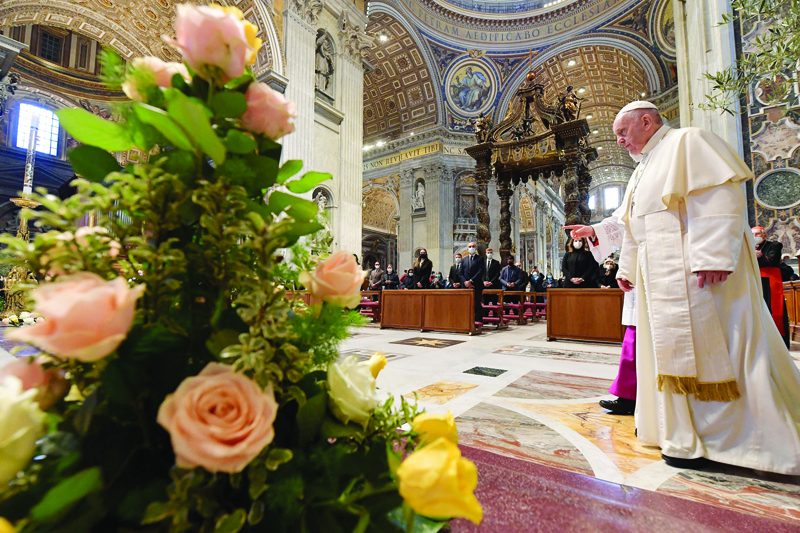ROME: Millions of Christians around the world celebrated a second Easter under coronavirus restrictions yesterday, as nations tried to control worrying COVID-19 surges. Despite vaccine rollouts gathering pace in many countries, dramatic spikes in cases have forced the reimposition of deeply unpopular restrictions from Canada to Europe and South America. Pope Francis urged Catholics to remain hopeful in his Easter Sunday address, calling vaccines an "essential tool" in ending the pandemic and urging their swift rollout to the world's poorest countries.
On the holiest holiday for the world's 1.3 billion Catholics and the second under the shadow of the coronavirus crisis, the pope focused his message on the world's most vulnerable-the sick, migrants, people facing economic hardship, and those living in war zones like Syria, Yemen and Libya. "The pandemic is still spreading, while the social and economic crisis remains severe, especially for the poor," the 84-year-old Argentine said, speaking to a congregation of only around 100 people inside the vast St. Peter's Basilica. "Vaccines are an essential tool in this fight," he said, calling on the international community to overcome delays in distributing vaccines "especially in the poorest countries".
Francis, who has focused on the plight of vulnerable groups since becoming pope in 2013, had already warned rich nations against vaccine hoarding in an address to the UN General Assembly in September. The pope said it was "scandalous" that armed conflicts around the world had not ceased. He called for an end to the war in Syria, "where millions of people are presently living in inhumane conditions", and in Yemen "whose situation has met with a deafening and scandalous silence".
He also expressed his closeness to Myanmar's youth -- "committed to supporting democracy" -- called for dialogue between Israelis and Palestinians, and urged an end to violence in Africa, citing Nigeria, the Sahel, Northern Ethiopia's Tigray region and Cabo Delgado in Mozambique. "There are still too many wars and too much violence in the world," Francis said, adding that April 4 marked an awareness day against landmines, "insidious and horrible devices".
Key month for Italy
The pope's Easter "Urbi et Orbi" ("To the city and the world") message in the Vatican came as 60 million Italians spent the Easter holiday under lockdown. The whole of Italy -- the first country in Europe to have been hit by the coronavirus -- has been declared a high-risk "red zone" from Saturday through Monday, with restrictions on movement and restaurants closed along with non-essential retail.
Despite the gloom, there have been hopeful signs that vaccinations are gaining pace in Italy, while infection rates dipped in late March -- although emergency rooms remain under enormous strain. April is set to be a crucial month for Italy's vaccine rollout, with authorities hoping to administer 300,000 doses per day within two weeks, according to the country's coronavirus commissioner, General Francesco Paolo Figliuolo.
Three regions, including that of Veneto which includes Venice, are also preparing to slightly loosen their anti-coronavirus rules from Tuesday onwards, passing from the most restrictive "red" zones to "orange". And celebrations have been dampened in South America too, where Brazil is in the grip of a devastating outbreak likely fuelled by a more contagious variant. The worrying situation in the continent forced Peru to go into an Easter lockdown, Bolivia to seal its frontier with Brazil, and Chile to close all borders.
'I beg you, get a vaccine'
The pandemic has claimed more than 2.8 million lives worldwide, but populations are growing increasingly frustrated with movement restrictions. Thousands protested in the German city of Stuttgart on Saturday against COVID-19 restrictions, with a heated debate under way in the nation about tightening them in the face of a third wave of infections. Such demonstrations have become a regular occurrence in Germany, bringing together members of the extreme left and far right as well as conspiracy theorists and anti-vaccine campaigners.
Misinformation about vaccines has been a major problem in the fight against COVID-19, fueled by how rapidly baseless conspiracy theories about the pandemic can proliferate on social media. A dramatic illustration of its impact is in Serbia, where the government is desperately trying to convince people to get vaccinated and has around a million doses available-a buffet of Pfizer, AstraZeneca, Sputnik V and Sinopharm shots.
"I beg you, people, get a vaccine," Serbia's populist President Aleksandar Vucic pleaded recently. "We have them and we will have more, I beg you, in the name of God, take them." Serbia's leading epidemiologist Predrag Kon said the slow take-up is "solely a consequence" of anti-vaccine misinformation online. - AFP



